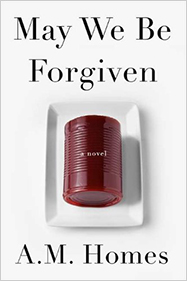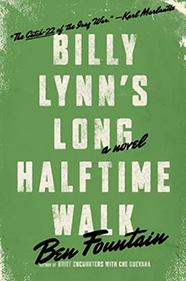by David Abrams
Buy on NOOK »-
March 12, 2013
Opening Round
-
A.M. Homes
2May We Be Forgiven
v.
3Billy Lynn’s Long Halftime WalkBen Fountain
-
Judged by
Dave Pacey
I’m lucky to get a chance to talk about books and reading all the time, because my patients, at least the fun ones, bring a book along to distract themselves from the terror of being at the dentist. Talking books is a great icebreaker, but they have to know that I am going to approve of their choices to put them at ease, rather than point out that, in a lot of ways, reading that awful piece of currently popular Oprah Book Club soft-core porn is the closest that I would come to having a root canal myself. The ToB, however, does not require such restraint.
What could we say about Billy Lynn’s Long Halftime Walk by Ben Fountain that wouldn’t start with awwww shucks, who wouldn’t like Billy? He is 19 years old, a sweet-faced virgin from a bumfuck town in Texas who gets into a little trouble at the end of high school because his heart is in the right place but his head and hormones are not. He ships himself out to the army to get himself straight and ends up a War Hero, capital W, capital H. Next thing, he’s a celebrity, on a whirlwind “victory” tour with all of his mates being feted by Hollywood types and getting royal treatment everywhere he goes, including the last stop, near his own hometown, as part of the Thanksgiving Day halftime show at a Dallas Cowboys game.
Naturally, Billy is disoriented by this experience. The enormity of America gives him vertigo, and words spoken to him hover in his mind like clouds. But his fellow “Bravos” are with him, to support him and remind him of the power of comradeship, the safety of brotherhood; they are a war story trope, that typical hash of rough and tumble grunts.
There’s also a trite subplot about how Hollywood and the one percent simultaneously exploit and corrupt the naive, but on the whole it’s a pretty straightforward red-state narrative of the Iraq war. One that supposes that what was oh-so-badly needed was a moment of vengeance so public that the whole nation could be as transfixed by its revelation as they were on Nina Leven (this is one of Fountain’s gimmicks, the need to phoneticize certain werds or phrases for emphasis).
Easily the best character is Sergeant David Dime. His relationship to the men of Bravo shapes the direction of the story and ultimately provides the motivation for Billy’s choices. Dime represents the essence of the military experience for Billy: chain of command, discipline, esprit de corps, pressure under fire, making hard decisions for the good of the group rather than the gain of the individual. He is the balance for the chaos of combat, the steadying hand when the chips are down, the kick in the ass when it’s needed.
The best parts of BLLHW are when Dime is on stage, but even his presence cannot save the book from Fountain’s style.
I didn’t mind the word clouds the first few times they appeared. Clearly Billy is overwhelmed by the celebrity experience, and the sudden readjustment he has to make to being back in the states…words float in his mind without context, OK; but by the time we have to read Destiny’s Child’s Oooooooooooohhhh’s over and over as a cloud it has gotten old. And speaking of Destiny’s Child, how is it that Beyoncé, who is so sensitive to her media presence that she famously trademarked her baby’s name, is mentioned, but Jerry Jones, the only person who could be the owner of the Cowboys, is given a pseudonym?
And the descriptions: Texas Stadium has “a slumpiness, a middle-aged sag to the thing that suggests soft paunches and mushy prostates, gravity-slugged masses of beached whaleness.”
Billy notes that “The women display more aptitude for game-day style than the men, who lumber around with Cowboys jerseys hanging past their coattails and their pants bagged around the heels of their boots, a fatal foreshortening of vertical line that makes them look like a bunch of hulking twelve-year-olds.”
I find Fountain’s choice of words jarring and distracting, as if he’s not confident enough in his storytelling to just let it happen without resorting to clunky metaphors.
A.M. Homes’s May We Be Forgiven also has some problems, but for me they are only skin deep. I am not wild about the title, for instance, and the cover doesn’t do anything to encourage me further, but luckily, this book starts fast. There is no subtle warm-up, and not very much foreplay before mild-mannered professor Harold Silver’s life is tossed into the Juice Tiger and puréed. The action is fast and furious, entertaining in a well-that-just-happened-what-could-possibly-happen-next? kinda way, but so much goes so wildly out of control that my immediate thought was: Can Homes possibly sustain this? The answer, for me, was a resounding yes, and all without chapter breaks. There, I said it, there arenochapterbreaks. I thought I was done for when I realized this, but 480 pages later I found that it didn’t matter even a little bit.
A menagerie of characters come and go—internet sex hookups, soulless lawyers, heartless doctors, runaway sexpots, kindly grocers, and Julie Nixon Eisenhower—as Harold slowly gathers around him the things that mean the most, the thing that he has been missing, the thing that when he invests himself into it gives the greatest dividend: family.
Homes’s art is her lack of artifice. There are no pyrotechnic displays of artful prose, just solid writing line after line. May We Be Forgiven is dark—and funny. The best laughs come from little counter-punch one-liners that pepper the story and give balance to the darkness.
Harold is with his niece and nephew in a limousine on the drive between the funeral parlor and the graveside burial of their mother, his ex-lover. The kids are exhausted by it all, so to distract them Harold asks the driver:
“Do you just do funerals, or funerals and rock stars?”
…”Me, I do funerals and airports. I don’t like rock and roll. They’ll sign you up for a two-hour job and four days later you’re still parked outside of some hotel, waiting for the guy to decide if he wants to go out for a burger. I like regularity and a schedule… You got lucky with the weather. Hope you don’t mind me saying but there’s nothing worse than working a funeral when the weather is crap. Puts everyone in a bad mood.”
If truth is stranger than fiction, then I want my fiction to be at least more compelling than the truth. I found BLLHW to be pretty predictable. Perhaps Fountain was a prophet of his own doom when he tells us that the Hollywood ne’er-do-wells were going to set the Bravos’ story in World War II. The story seems just that generic, and it’s another reason that I wouldn’t recommend this book over any true-life account from the Iraq war.
May We Be Forgiven is overloaded with strangeness, and as the absurdities mount it becomes the negative space, the subtle normalcies and moments of pathos that pack the emotional punch. The denouement is brought about by Ashley, Harold’s niece, around whom he has built the hodgepodge family that provides a scaffold for his reconstruction as a functioning human. It is a moment that represents a pure distillation of all of the emotion that she has been repressing since the loss of her parents, and it saves them all. Like every word in May We Be Forgiven, it is perfectly placed.
Match Commentary
By Kevin Guilfoile & John Warner
John: I’d like to have reader judge Dave Pacey as my dentist because my dentist wants to talk politics and healthcare policy rather than books, which is why I ask for nitrous for even a routine cleaning.
I don’t know that we’d always agree about books though, since the passage in Billy Lynn’s that he finds objectionable, the one about Texas Stadium having a “slumpiness,” makes my inner aesthete sigh with pleasure.
I find Billy Lynn’s to be a novel that’s expertly observed. The eye is simultaneously jaundiced and clear.
The other passage Pacey cites, the description of game-day couture, strikes me as both accurate and interesting as part of the bigger-picture motifs of American excess, hero worship, and playacting that Fountain is working with in the novel.
But these differences are exactly why we continue to have so much fun doing this year after year. All of us have looked at a critically praised novel, checked it out for ourselves, and wondered what’s wrong with the world.
The answer is nothing, or everything, depending on how you look at things.
Kevin: It is often interesting to read a thoughtful review of a book in which the critic’s reading of it is so far removed from your own. I didn’t find anything about Fountain’s writing to be “jarring” or “distracting,” and it certainly doesn’t lack confidence to my ear. I’m also puzzled that anyone could read this novel as a “red-state narrative.”
But we have spoken in the past about how reviews are often rationalizations more than they are logical proofs. The fact that we disagree with his reasons doesn’t mean Judge Pacey is wrong for disliking Billy Lynn’s, and you and I are not wrong for loving it. You cannot argue someone into liking a work of fiction. Our reactions to art happen on a gut level, and guts are famously immune to persuasion.
(It’s a small, practical point, but I would like to answer Judge Pacey’s question with regard to the Beyoncé/Jerry Jones issue. The reason Fountain didn’t change Beyoncé’s name is because she doesn’t do anything in this book except be Beyoncé, and at some distance. On the other hand, the character of Norm does and says things that, should his name have been attached to them, might make the real Jerry Jones irritated, and perhaps litigious.)
Billy Lynn’s Long Halftime Walk has a lot of fans and in another year it might have had a chance at the Zombie Round. This year we have a number of bestselling-type novels with passionate fans in competition. It might sneak in there, but I’m not putting paper money on it. I just hope you and I did it justice. I think it’s a great book.
John: As much as I liked Billy Lynn’s, I’m not too upset about this result because May We Be Forgiven is one of my other favorites from the past year. As Judge Pacey notes, it is a very strange book, but I was riveted to the page.
I’m a Homes fan from years back so I was well prepared for the weirdness, but in my Biblioracle year-end wrap-up for the Chicago Tribune Printers Row book supplement, I named it the “best book that I’m least likely to recommend.” The events that unfold in the narrative looked at outside the frame of the novel are somewhere between ridiculous and absurd, but within the world Homes constructs they march on with an irresistible—logic is the wrong word—inevitability.
While we agree on the merits of the book, I have to disagree with Judge Pacey about the “lack of artifice” in Homes’s work. The success of her writing depends on an extremely high degree of artifice. The deadpan/matter-of-fact tone to Harold’s narration, the jokes and puns and multiple invocations of Don DeLillo offer lots of winks and a handful of jabs and nudges. It’s a book that’s well aware of its absurdity, but Homes plays it so straight that we can’t help but give in.
What impresses me is that Homes can get me to take these people seriously as they ricochet from oddness to oddness. I see her as a kind of post-post-modernist. There’s something Pynchonian about her book, but rather than swallowing the world and leaving us a black hole, like Pynchon does, Homes lets some light escape. It’s considerably more hopeful than some of her previous work, which I think disappointed some of her longtime fans, but I thought it was her best book yet.
I recommend it highly—for the right reader, that is.
Kevin: As much as I disagreed with Judge Pacey in his assessment of Billy Lynn’s, I am on board with his rundown of May We Be Forgiven. I actually just read it and it still makes me happy to think about it. Not being as familiar with A.M. Homes, I was not prepared for how dark and funny it was going to be. And it just moves (marches, as you say) effortlessly and relentlessly forward, page after page. It caused a last-minute disruption in my own personal list of favorites in this tourney. I think it’s terrific.
I also think your disagreement with Judge Pacey over the “lack of artifice” in the novel is a semantic one. I believe he was he trying to differentiate between Fountain’s prose, which he found a little show-offy (disagree) with the lovely matter-of-factness of Homes’s sentences (agree). Clearly there is some ironic distance between the real world and the oddballs inside this book, but I don’t think that’s what he meant.
But you make a good point. To whom would I recommend this book? Hypothetically everyone all the time. But it’s a novel where you’d have to know someone pretty well to place it confidently in their hands.
As you mentioned, you write a popular (and excellent, I will add) weekly column for the Chicago Tribune Printers Row called “The Biblioracle,” in which you recommend books to readers based on the last five books they have read. (The Biblioracle occasionally makes an appearance at TMN, as well.) Obviously the recommendation business, like shoe cobbling, is really about gut instinct more than anything. But I find myself to be a very conservative book recommender. Most readers I know don’t like books that challenge them too much. They will say they want something original, but have little patience for any book outside their comfort zones. (And of course, bookstores and publishers feed this desire by endlessly compartmentalizing novels on the shelves.) As a result, there is a long list of books that I gush about generally, but recommend to a specific person very rarely, if ever.
As the Biblioracle, what have you learned about the typical reader’s willingness to follow you out on a recommendation ledge? Am I being too uptight as I fail to spread the love one-on-one about books I personally find wonderful, but also odd or challenging?
John: To my mind, the first responsibility of a book recommender is to provide the reader something they will enjoy. Otherwise, you lose credibility and people will no longer come to you for recommendations, so your uptightness is more of a common courtesy.
That said, as the Biblioracle, I try to fulfill the primary directive while also pushing the envelope as far as it will go for that particular reader in order to expand their palate of books and authors. I do this not to move the needle on what people read towards what I’d like them to read, but because I think that readers who come to me will really enjoy having a somewhat different vein of literature opened up for them.
For example, if someone submits a list of recent reads filled with very popular, but also somewhat formulaic (an observation, not a criticism) and exclusively male crime/thriller writers like Robert Crais or Harlan Coben, I will recommend Laura Lippman, Kate Atkinson, or even Patricia Highsmith.
For me to recommend a book that’s truly “challenging,” the requester needs to demonstrate an openness to that challenge. If Gravity’s Rainbow is on someone list of recent reads, I’m confident I can recommend William Gaddis’s JR. If they’re on a Virginia Woolf kick, I can recommend Djuna Barnes. The interesting thing about these sorts of recommendations is that there’s a much higher likelihood that the reader will find the suggested book “revelatory” than when I’m working in “less challenging” territory.
I think this just speaks to the different demands different readers have of books. I only go for “challenging” books occasionally. Sometimes I just don’t have the mental horsepower necessary to process something like Infinite Jest.
And just because I might like two books, and one of those books is on the list of recent reads, I don’t necessarily automatically suggest the other book I liked. As a present example, I loved both May We Be Forgiven and Beautiful Ruins, but if someone said they loved Beautiful Ruins, I wouldn’t necessarily recommend May We Be Forgiven.
To recommend A.M. Homes, I’d be looking for someone who’s chosen writers like Don DeLillo, Lydia Millet, or Ken Kalfus.
Kevin: Here’s my scorecard: I’ve read 12 of the books recommended by this Tournament. Five of those are novels I never would have picked up if not for the Rooster. Three of those five are books I loved.
And my world is just that little bit bigger.
Perhaps not unrelated to that thought: Tomorrow we have Gillian Flynn’s Gone Girl, which is probably commercial publishing’s Book of the Year (Non-Spanking Division), versus Miles Klee’s Ivyland, a debut novel with very passionate supporters. It’s a face-off between arguably the best-known and least-known books on the list. It’s like the Godzilla movie where Godzilla fights a gigantic radioactive rosebush. Not to compare Ivyland to a mutant rosebush (or Gone Girl to Godzilla for that matter). Just that Godzilla is really famous, and the big rosebush is not one of his more famous monster foes. Still, if you enjoy monster-on-monster cinema, I recommend it! Because it’s pretty good, actually. True fact: It was written by a dentist.
(See how I brought it all the way back to the beginning there?)
























